9.12.14
3.12.14
28.11.14
atopia
27.11.14
25.11.14
1er prototypage d'une boîte à outils pour lx dragqueer
développé avec María, Xavier et Anne dans la session de travail #genderblending, organisé par Constant - BXL , 17 au 22 novembre, 2014
the limits of
"Queering can only be thought today from its position in a dynamic
relationally that blurs the distinction between subject and object,
difference and repetition, separations and connection, identity and
collectivity."
Magnus Eriksson
20.11.14
15.11.14
party like it's 1984
Etiquetas:
cryptography,
cryptoparties,
cryptoparty,
events,
methodologies,
politics,
privacy,
tools,
workshop
11.11.14
9.11.14
4.11.14
considering your t o o l s
f r e e c u l t u r e f o r u m 2 0 1 4
Wednesday, 5 November
from 14:00 until 18:00
In Bau, Design College of Barcelona (see the map)
Building A – Classroom A.0.6
I m p a r t e d b y :
Femke Snelting & OSP (Open Source Publishing)
D e s c r i p t i o n :
This workshop starts from our experience with using Free and Open Source software in our (graphic) design practice. We would like to share what this means for our own work, and more particularly how it has an effect on our ideas about design education. Free culture challenges traditional art-education paradigms because it invites participants to move between roles (teacher, student, developer, user) and because it necessitates a fundamental questioning of the political and cultural heritage embedded in the technologies that we employ.
Art- and design students are typically expected to create
their work using proprietary tools for research, prototypes,
(re)presentation and production. Sometimes, they are taught particular
packages but more often the impact of software and hardware choices will
be ignored. How to engage with the growing importance of digital
processes in a way that relates to the intellectual and aesthetic
paradigms of design-education? How to consider soft- and hardware as an
integral part of design practice, and develop more intimate and
experimental relations with digital tools? And what is the importance of
using Free, Libre and Open Source software for all this?
P r o g r a m m e :
A tour through the current practice of OSP, a Brussels’ based design caravan that decided in 2006 to use Free, Libre and Open Source software only. Changing from proprietary (ie OSX and Adobe) to Free Software means not just replacing one tool by another. It means engaging in the design of those tools, rethinking the collaboration processes, and the way one distributes their work. How has Free Software changed the practice of OSP? How do they work together now? And in what way have their aesthetics changed?
T a l k i n g p o i n t s :
- Free Software tools might be designed for a different public than graphic deisgners. For scientists, activists, programmers or amateurs, for example. Using these tools means confronting paradigms different from the Graphic Design mainstream.
- The Free Software community puts a lot of emphasis and archiving and sharing their sources, choosing to release ‘source files’ early in the development process: ‘Release early, release often’. OSP follows this approach by sharing their design files online, right from the start of a project. How does this change the relation with the client/collaborator and the public?
- Within existing proprietary design tools there are not many infrastructures for collaboration. The world of Free and Open Source Software has great tools for collaboration, but they are meant for programming code. OSP tries to imagine other infrastructures that allow to design together: open ended, fluid, Read-Write exchange…
- Using non-mainstream tools often requires new expertise. Every new OSP projects mixes designing and learning. We may find ourselves programming too, even if we’re not educated programmers and may be less confident about it. How do we live this constant ‘relearn’? And how do we find the time to do so in the market of Graphic Design, where time is always in short supply?
Collaborative mapping exercise using Graphviz and Etherpad (60mins)
The starting point for this exercise are notes from
preparatory meetings. While brainstorming about relevant keywords and
concepts, we generate a collaborative visualisation in real time.
Graphiz is a network visualization software software
developed in the early nineties by AT&T labs and mainly used in
bioinformatics, machine learning and other technical domains. Etherpad
is an online real time editor originally developed by Google. After its
release as Open Source software it has become immensely popular for many
types of collaborative writing. The toolset is complemented by a small
script that automatically imports etherpad content into a local
installation of Graphviz, and updates the graph.
This exercise demonstrates a few tools and methods
emblematic for the discussion: simultaneous editing of content, form and
code; engaging with cultural paradigms of specific tools and mixing
existing tools and platforms with additional DIY pieces. Please bring
your laptop!
Productive tensions between institutional education and the practice of open design (60mins)
A discussion about experiences in design education that
engage with the growing interest in ‘open design’, and the way Free,
Libre and Open Source software could play in that.
- What is the place of teaching tools in design education, at BAU and in what way could we imagine to make changes?
- How to develop a consideraton for digital processes specific to the type of design taught at BAU? Free, Libre and Open Source software: motivations to introduce them, and possible challenges
- Software and hardware as Tools of the Trade: shifting ‘professional skills’ beyond market requirements
- The importance of self-education in hacking/free software contexts: alternating between teaching and learning
- How to shift from learning about specific tools to understanding processes (ie ‘Photoshop’ or ‘GIMP’ vs learning about image processing).
- Learning about FLOSS paradigms, engaging with Free Culture: institutions engaging with communities
- The place of open standards and Free Licenses. Publishing and archiving of teaching materials and outcomes
- Programming for designers: teaching skills and/or attitudes?
- Platforms, tools that might support another understanding of learning and practice: etherpad, wiki, mailinglist, command-line, …
- Every institution challenges the way FLOSS and design are brought together in a different way. Stories from La Cambre, erg, PZI, Merz … and BAU.
- General discussion (30 mins)
Crossing open design-education vs practice: What does this mean when we think about future schools?
L i n k s :
- Considering your tools – a reader for designers and developers http://reader.lgru.net
- Wiki gathering materials for courses around digital culture at Ecole de Recherche Graphique, Brussels (FR) http://ustensile.be
- Relearn Summerschool 2014: http://relearn.be/r/about.html
- Relearn Summerschool 2013: http://relearn.be/2013/r/2013::introduction-script.html + publication: http://relearn.be/media/relearn-2013.pdf
- A network of free culture aware educators in art, music and design education: http://eightycolumn.net
- Interview with Open Source Publishing (FR) http://silo.schr.fr/osp_etapes_red.pdf + http://etapes.com/etapes-221
- Various workshops developed by OSP http://osp.constantvzw.org/workshop/
- I like tight pants and unix for art students (Eric Schrijver) http://i.liketightpants.net/and/absolute-beginners-unix-for-art-students-part-1 + http://i.liketightpants.net/and/absolute-beginners-unix-for-art-students-part-2 + http://i.liketightpants.net/and/absolute-beginners-unix-for-art-students-part-3
Workshop for teachers from Bau, Design College of Barcelona.
Prior registration is required. The last date for registration is 31 October, 2014.
There are 20 places.
To register, send an e-mail to:
jara.rocha[@]baued.es
Indicating as the subject:
‘Registration for FCForum Lab Workshops’ and the name of the Workshop (Considering your tools).
+ i n f o :
http://lab.2014.fcforum.net/en/
2.11.14
Rethinking the Infrastructures of Knowledge Production
Etiquetas:
contándonos,
culture,
extituciones,
infrastructures,
no return,
stuttgart,
text logistics
1.11.14
31.10.14
29.10.14
26.10.14
19.10.14
18.10.14
17.10.14
laberinto de pasiones (28O-02D)
Rubén y Jaron coordinan esta cosa tan chula que se cuenta así:
"De forma reciente hemos experimentado el resurgir de una multiplicidad de materialismos. De ciertas miradas del mundo posthumanistas que pretenden llevar el materialismo hasta sus últimas consecuencias. El interés por entender las agencias y potencias de la materia hace que nos interroguemos sobre las condiciones materiales de existencia más allá de la voluntad de los hombres y mujeres que producen su acontecer histórico. Densidades, viscosidades, resistencias, distancias y humedades se entrelazan con infraestructuras, artefactos, herramientas y tecnologías, cruzados por serotoninas, dopaminas, testosterona y feromonas, creando redes complejas que afectan y se dejan afectar. La agencia ya no reside en la voluntad sino en la densidad de las redes que integran humanos y no humanos, discursos, máquinas y animales. Esta complejización del materialismo, aceptar que no vivimos en un mundo lineal ni determista nos obliga a repensar nuestro análisis de las cosas, sobre cómo se relacionan eventos, sujetos y tecnologías, y sobre todo, sobre cómo acontecen las realidades materiales de la cultura."
Fechas (martes): 28 de octubre, 4, 11, 18 y 25 de noviembre y 2 de diciembre.
+ info en la web de nociones comunes bcn
"De forma reciente hemos experimentado el resurgir de una multiplicidad de materialismos. De ciertas miradas del mundo posthumanistas que pretenden llevar el materialismo hasta sus últimas consecuencias. El interés por entender las agencias y potencias de la materia hace que nos interroguemos sobre las condiciones materiales de existencia más allá de la voluntad de los hombres y mujeres que producen su acontecer histórico. Densidades, viscosidades, resistencias, distancias y humedades se entrelazan con infraestructuras, artefactos, herramientas y tecnologías, cruzados por serotoninas, dopaminas, testosterona y feromonas, creando redes complejas que afectan y se dejan afectar. La agencia ya no reside en la voluntad sino en la densidad de las redes que integran humanos y no humanos, discursos, máquinas y animales. Esta complejización del materialismo, aceptar que no vivimos en un mundo lineal ni determista nos obliga a repensar nuestro análisis de las cosas, sobre cómo se relacionan eventos, sujetos y tecnologías, y sobre todo, sobre cómo acontecen las realidades materiales de la cultura."
Fechas (martes): 28 de octubre, 4, 11, 18 y 25 de noviembre y 2 de diciembre.
+ info en la web de nociones comunes bcn
12.10.14
11.10.14
10.10.14
4.10.14
29.9.14
The Darmstadt Delegation / DL14
The darmstadt delegation came together on the basis of a shared
experience of troubling differences in the politics, values and
practices of “activists" heavily using networked technology for their
struggles, and of "techno-activists" who struggle to develop progressive
and alternative technologies. We observe that, loyal to a utopia of a
globally functioning interwebs, techno-activists usually organize around
universal values: information must be “free”, secure,
“privacy-preserving”, accessible, etc. In comparison, those who bring
their political struggles to the interwebs may express political
differences across a broader spectrum, situated in local and/or global
contexts. However, pragmatic decisions due to time pressure and lack of
resources often mean that these struggles may integrate themselves into
proprietary and conservative technical infrastructures. As a
consequence, during “sneaky moments of first getting things done", many
organizational matters are delegated to "techies" or to technological
platforms.
If we believe the mantra that our tools inform our practices and our practices inform our tools, we may want to radically reconfigure these divisions of labor between “activists” and “progressive techies". But how? Where do we start? What are ways to resist those sneaky moments in which we pragmatically submit ourselves to "specialization of work" that reproduce hegemonic divisions of gender, race, class and age, and that reinforce ideological differences between activists for social justice and activists for just technologies?
The darmstadt delegation follows in the steps of numerous initiatives which are working on crossing divides while developing technical alternatives for current day struggles. Most recently, we see ourselves in conversation with the numerous initiatives that have aligned around backbone409 [1], interference [2], transhackfeminist camp [3] and the internet ungovernance forum [4]. We are excited to have the opportunity to continue some of these conversations with you in the context of DL14 [5]. Due to unforeseen constraints, only Seda Gurses will be physically present at the conference. For those who would like to discuss more, I encourage you to get in touch with all of our delegates [0]
[0] Currently active delegates are Femke Snelting (ConstantVZW, Belgium), Jara Rocha(Objetologias, Bau School of Design, Spain), Miriyam Aouragh (University of Westminister, UK) and Seda Gurses (New York University, USA).
[1] http://backbone409.calafou.org
[2] http://interference.io
[3] http://transhackfeminist.
[4] https://iuf.alternatifbilisim.
[5] http://digitallabor.org/
If we believe the mantra that our tools inform our practices and our practices inform our tools, we may want to radically reconfigure these divisions of labor between “activists” and “progressive techies". But how? Where do we start? What are ways to resist those sneaky moments in which we pragmatically submit ourselves to "specialization of work" that reproduce hegemonic divisions of gender, race, class and age, and that reinforce ideological differences between activists for social justice and activists for just technologies?
The darmstadt delegation follows in the steps of numerous initiatives which are working on crossing divides while developing technical alternatives for current day struggles. Most recently, we see ourselves in conversation with the numerous initiatives that have aligned around backbone409 [1], interference [2], transhackfeminist camp [3] and the internet ungovernance forum [4]. We are excited to have the opportunity to continue some of these conversations with you in the context of DL14 [5]. Due to unforeseen constraints, only Seda Gurses will be physically present at the conference. For those who would like to discuss more, I encourage you to get in touch with all of our delegates [0]
[0] Currently active delegates are Femke Snelting (ConstantVZW, Belgium), Jara Rocha(Objetologias, Bau School of Design, Spain), Miriyam Aouragh (University of Westminister, UK) and Seda Gurses (New York University, USA).
[1] http://backbone409.calafou.org
[2] http://interference.io
[3] http://transhackfeminist.
[4] https://iuf.alternatifbilisim.
[5] http://digitallabor.org/
28.9.14
26.9.14
25.9.14
23.9.14
18.9.14
14.9.14
11.9.14
3.9.14
algo
Etiquetas:
algo rythm,
algolit,
algorithm,
diagrams,
pensamiento diagramático,
suzanne treister
2.9.14
26.8.14
UKI
[UKI - viral game - an intro by shu Lea Cheang on Vimeo]
> he encontrado ésto, que es de hace ya un rato, y me ha enternecido mucho
+ info en la web de entonces
Etiquetas:
gender,
gender and technology,
genderblending,
installation,
shu lea cheang,
uki,
viral game
3.8.14
THF!
T H Ffeminist
convergencia trans
gente de todos los géneros
disentir socialmente
piratas guerrilla punto
eclectic tech carnival
genderhacking
convergencia trans
gente de todos los géneros
disentir socialmente
piratas guerrilla punto
eclectic tech carnival
genderhacking
del 4 al 11 de agosto
+ info aquí + aquí + aquí
Etiquetas:
2014,
calafou,
critical_technology,
eclectic tech carnival,
gender,
queer technologies,
technology,
THF
1.8.14
26.7.14
25.7.14
Suscribirse a:
Comentarios (Atom)
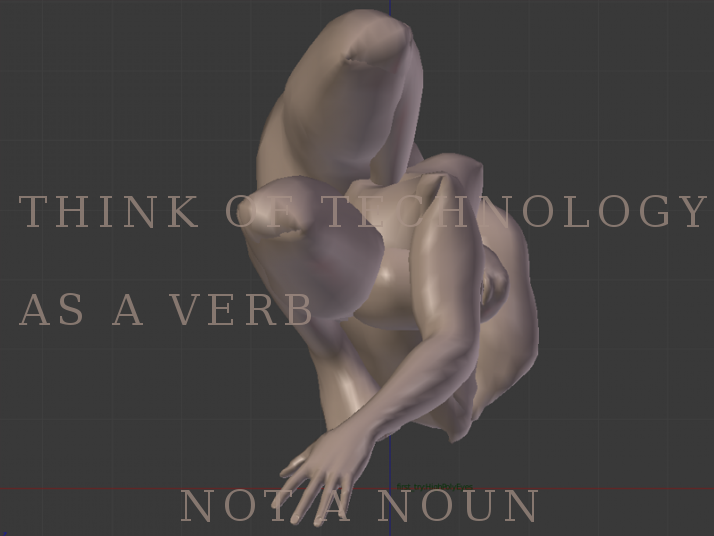




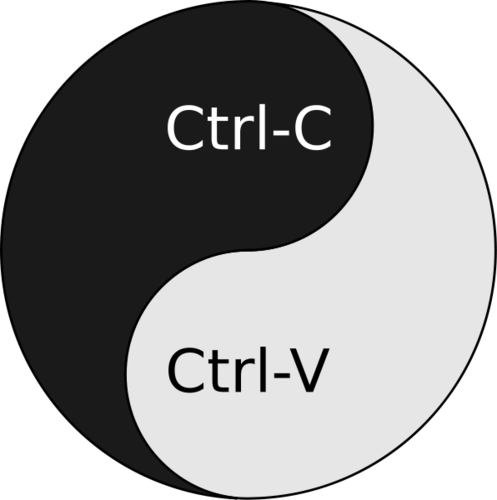











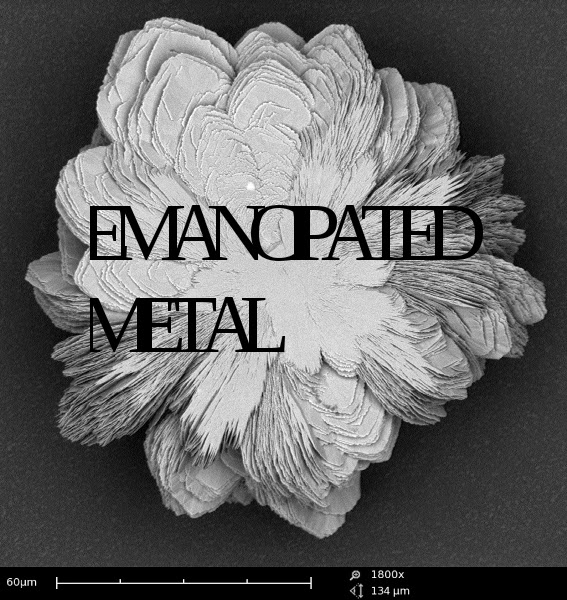














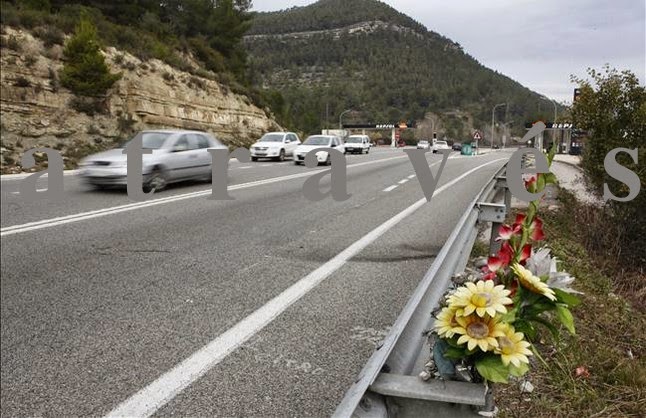




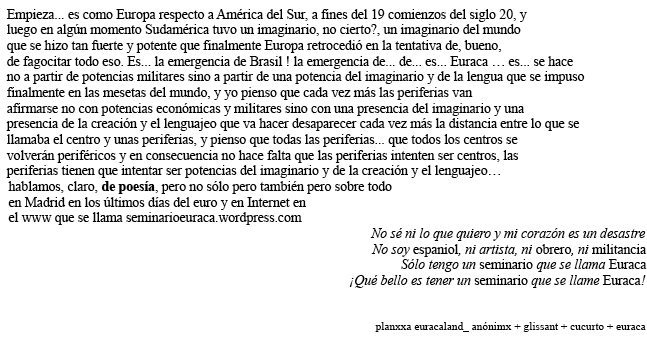
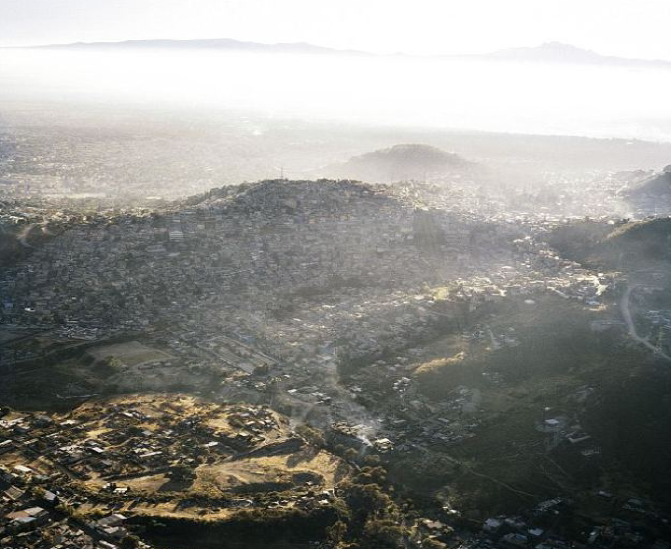

![[proyecto] Altas latencias](https://blogger.googleusercontent.com/img/a/AVvXsEiBpD8AFlYRdLzeJ2Hsn_CW_e5gS2aqI95InyU5RVD32AgQq1pu7RkVfqaIVCx8HGOvz6-KsASWhMiTRiAOeMFuq_5CdJ4oBpbugFCz27q4naB5GwKSI6367EAzmdV7gwMJ3bsY49giAjtGaszVwN6XK8Jt9TGRgsuh4UAGYJiG6-BT5M8TUcuqDBvoOME=s220)

![[txt] A breeding ground for uncertainties](https://blogger.googleusercontent.com/img/a/AVvXsEj8Ul_82KszibGV8b6jg9LFyWXEGE4qp6ecSy5BMMylXRoJD3M9p69kVu-AzxnSX2giXA1KXDQK0N-9PgDXC3iiwOb8gbekKC9_uczQKXOnaWH8az3En1ZSVefP22hPQWRvsUBccZEqf9CI15VXUsq8xboFMelx4l9oFikZJpvUX3xTe4mnAAeXwpDzIg0=s330)
![[Bugreport] to Frontier Climate](https://post.lurk.org/system/media_attachments/files/111/901/018/803/503/560/original/1075209e931cabe8.png)
![[zine] Ancho](https://blogger.googleusercontent.com/img/a/AVvXsEgxhMNpFpNTQs8-WPjqQ4xMJ3_BZJbszhAfiHl63dmkzEof-nuHBGdzLZzpneNz9vTWNnw4k1RBBRlY8Lku7gu3bPCmoB58oyB8p0m85z8G4vsPwQWrNDmDhPrcLyvW0SP8AVn6WTAkKi6967tUChbVAl73hP9Umq097rixVNbci22Ua_iZFxOiunVkTjE=s312)
![[radio] naturoculturas son disturbios](https://blogger.googleusercontent.com/img/b/R29vZ2xl/AVvXsEh1vf5WGEHGsX7aYwBLxMSY5_yPI3DzKWwCdqAOOIDKz0yFkISa81hx2ljEMCPPb6bRtYCCtoOb89SdCQET4P_BJoQeYy5990dZ2FmiqJL_Sb_ROngQphHGA9wnu3rIZyUkI7LPLNDqRXE/s220/tapiz.jpg)
![[Journal] La composición activa de la presencia](https://blogger.googleusercontent.com/img/a/AVvXsEgWJBnXgfCm300uKPAr-n4sEqPCBHxy2Hxheu2bFuYCl0IgeJCmJ_7U6SwP01cDamYTfgGpbMtgeSS6KtRm5j85_bclhQ4wn7f8DfSKu7C3_AM87wNHhELUwQ_VXIemDotxFy_h2kiZuqa1h2vLKHeMUALEg63BeR_dbpHh4Y7DEfZgKekOA0eCxPT_lJk=s320)
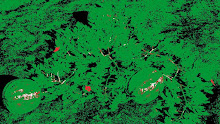
![[fellowship] LaaS (Life as a Service)](https://blogger.googleusercontent.com/img/a/AVvXsEijogwX9jgADqQ9A00tu8fCFaF8ARU8Sq0EXI0Z_PBE8M-SVpgMWAUiHJjw4-QwLjz-KCQlOgyvJNwpvBLe41Gr7xN0xlWzvyrGxZg9mUIH9-q3xEF51MSk6UnyUkD--ZptqoMcp7XSlgD8wV5MVeUaN8o7X34SnScuLZ4C76XyW6U8JDneHWrSw8vZ=s220)
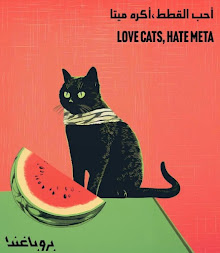

![[associate membership] TITiPI](https://blogger.googleusercontent.com/img/a/AVvXsEjcMlj6-I_3r2L84w6kGyECKoYCgG_clIbPgkJU643pGFonPn9P-UV_qnNI3V-pjgEVFigNgse4IABpsD7WRie8evGe1jdLZOV92rg_McRtrbSIJOTVzyUW5Xx4ITTYM3JL-d90tF-XGKpKscmUYcnrts654lnj1hVbrHZUBvKA8X5pZPXL6DIoILz9=s341)
![[escuela] Elefantes en la habitación](https://blogger.googleusercontent.com/img/a/AVvXsEgg8WMXXVVHA5uHIAlHGUstKTSRhzQEhEORdROKz8QBgLMPCtYxyNIyCnuFkFwDAoixgS1XMLDeGEtm5P0cXW3AUi6AB179S0Ei6BueXW8NXbREYnik1VICivjPvl7G2Ti597fcw2OQ38cWzV0BpfG3MijQiSAzCdVmj67HS4VIiCsQV5dLgdOubMvIGiM=s220)
![[book] Volumetric regimes: material cultures of quantified presence](https://blogger.googleusercontent.com/img/a/AVvXsEgmU-TcPBoSAK-bYjc2IS1c3j6YaoY0bAmoWeJphwdAVgJ1vRcZP_dg5Ki_GWBYPakurYUpM6XIlUGJKAKALaYhdx-sLtC-KlL3NocFIq5S3RzmuefQP1pCwpUTjJ4it_itZKmY1FLZ-GuvAE1PHWP90G9nxsDRdyPVaoyQxl6s3A0SQEeRxP5fNlcI=s332)
![[manual] Queering Damage. Methodologies for partial reparation... or not.](https://blogger.googleusercontent.com/img/b/R29vZ2xl/AVvXsEj8Q0pcpgV4ta3XRYXd7_TLrE-e8iIRW9gtbF-tRh5pKQClpqaw6qbr0dUadU7sASJ9ElOlYJwy4mPROA46dn7bGeTFwAb09LCR2yMuQOkeJUCeRUrAGKai3pPb9x7nvSaISuDx8FZlppg/s1600/QD.png)

![[project] the underground division, with Helen Pritchard & Femke Snelting](https://blogger.googleusercontent.com/img/b/R29vZ2xl/AVvXsEiP7ySE_-Ag-61vgRhsOgPJOVlvsnsupcriKB9x-nxLA_XjAYdkeYSOajqqqBnnGI82iX4wCbaDfnYfAc9lSHl0ny7ES0V1xTeJl3zW0sfLto6Ardt6AiZmYZlqizeDw98sijpGLY_K1p8/s1600/unthoughtinfrastructure.gif)

![[expo] Dorm en l'accident que provoca](https://blogger.googleusercontent.com/img/a/AVvXsEgjj7ASH7edRFh6yretcviCckrs19chm_iyuaa0PyNeRqKj6EWr5C8wRAUQXNsR0rSxSIY0-j_a0z1PfmEjabITfUBWfMwqCNKLo9Fvb65P31PtSbEiBBJ_HhiNrs1iVFZsD4LWicCfvZXM20ivsPoG2XfLBZYGBhv7Iavs2VPb0uGV2mYehjf7mzdm=s220)
![[exposición] La Irrupción](https://blogger.googleusercontent.com/img/a/AVvXsEiJnQT68iCPb08I1Bq9Cq8cGWfRLxF_cwD3tqfqovDvh1oy1L-Mj5DVkBsyBEezs9ydH0kVterKMClhihz3EkJgySfauazM8-YsPZRI2qUOQKSWKE8phvjFy5lPNqE5r60m0bbgm4eyMXVA4xktKU5hrJoQ6gBv22a7QRAhFlmFDxYQVATl6orDZ-oK=s311)
![[Fellowship] Spectral Infrastructure | Cell for digital Discomfort](https://blogger.googleusercontent.com/img/b/R29vZ2xl/AVvXsEiQcHHKYPqthXh3l6TFAl4KB_uNscYjF29Pklgc3nT8KpUaF8MNN4My_cB-2mQV3Kt13Y7g8whVVq9nOGXJGsNJU3TAw-1r1z_TYyn2TqRR7EEx2k4XFdpWlfXfwVeaixEtOxBgS6aOjQo/s220/Spirit-Labour-1-web-2000x1335.jpg)

![[paper] Figurations of Timely Extraction](https://blogger.googleusercontent.com/img/b/R29vZ2xl/AVvXsEheNeBTv2n__LM26gVP5_NJsH4-vssVsRn3CspeiFnoCsUY4RmKBE1dTzYurmx73Nt5hceLv_zcORBxLnGV5AR3tJnb579NJ5194ThAdnH5itHI-e9W79rOLD5_sPpkmjjGb1RT1RVnmN0/s1600/hueco.png)
![[weft] The Relearning Series (with Martino Morandi)](https://constantvzw.org/site/local/cache-vignettes/L650xH614/arton3397-dd459.png?1609926532)

![[text] The Courier Bag Praxis of Friction](https://blogger.googleusercontent.com/img/b/R29vZ2xl/AVvXsEgBtBXr6VHozr_KsHsqSJ7_sMDHSSc0l0pD4wcrZJZzqX6IUeTjQEED64R-hg4QG0lK8RHN6J6j-BtRbsTDwI-R-5OlzwcCDYPHX_q7_yTCbgnJEqPic7LsADeclTIpqgX8SWZpdXdncKs/s1600/amz.png)
![[text] We Have Always Been Geohackers](https://blogger.googleusercontent.com/img/b/R29vZ2xl/AVvXsEg3_-X1JXUAU7D1PqsbnkyLFi1PAvVb4P9ZPszvgZkaI5q5lY4JDDPsjeBScyoev-cxl3DD9ocyeaj4ROLezLzA1RM00Ib3SGeaMUiNvnhsSOtRHVy9pK2WQ4p8gXBbDqEABMiaM6uhjzk/s1600/600px-Image04.png)
![[entrevista con Nerea Ubieto] unos corpus a través de otros](https://blogger.googleusercontent.com/img/b/R29vZ2xl/AVvXsEiUAX_3sRJEwxPRY1X9jmG1DxmZBTqhXRVHN3wcA4h_oO6HNIGt9uroK9oP9ktNm79nbj0z6Kt02SNIBynmRmAbxHJa3bWPttwiF1Iffm8azfPumTmr32-pC8bQJ1cRwFvUm5QRfYjiWrs/s1600/yaaun.hotglue.me.jpeg)
![[book] Iterations](https://blogger.googleusercontent.com/img/b/R29vZ2xl/AVvXsEg6AIPpC3jitHSZRTZUAUrI-C01YGIeyM7C7ZPDO0HQhUx0nqTOyVUdpOOJBVh66ZwBJk-Z_NLtlDZtIhB5zyj7lzi1psorzemK2pJKiRk75Z8_8K60nJcdJEz1nmUZqmTm-BId_XYjINo/s1600/iterations_img.png)
![[text] Depths and Densities: a bugged report](https://blogger.googleusercontent.com/img/b/R29vZ2xl/AVvXsEj2kAiZhHGbiApkAnVW086MP8Auew-PJjqA5m1dP0C0PQTv99laH46OO1-5K5YOzYQIYBpgG4SsC8ibvqLz2fkIBoUPi3_dL6dfOir_DosCim4oY2Tq9877vFU-6SSWLfps0rLs_v3wBCM/s1600/2.gif)
![[expo] ROCK REPO](https://blogger.googleusercontent.com/img/b/R29vZ2xl/AVvXsEjMCpx4QnmsTfWUtRNlzUOhGnEWqZozBYCPkzKG3cs29OniGUqAzXFMDp4EggGvEM1B3xDC-Kf9QFHKe2EqKL6QGLhttL6FzalmkJYo8f9_aKdnmiUf61_QMaoa7F228d5farlhzSeV1Ok/s1600/ROCKREPO.png)
![[ciclo] unsupervised imaginations](https://blogger.googleusercontent.com/img/b/R29vZ2xl/AVvXsEhjO8oPteLww8zP6OPAvLXOm4uiwvBIFJ0k9DWqK7YEfSau1A9E0RdvY0-qokscG-y_a9sgou1xkCNBSw_VvBOlsFqLbcR_HSDg7K3hRB5LqkOjTdwfaCWLsemvyyt1lttyqz3zgyuzGZY/s1600/done.png)
![[texto] O o no O](https://blogger.googleusercontent.com/img/b/R29vZ2xl/AVvXsEjW0TtZQPjFHfhxlODgGdVzgg68Ac0-ARhty2p_GLpS376bYEQzPCLV3rcfveLPHTKa5NayqjcU5tkEHR1XravZ0ELvayh3Llh-dTbLDoTzqCu2-o4_XL-x7BOorECQVHzvrAbPgArKd5I/s1600/OOO.png)

![[text] testing texting South: a political fiction](https://s-media-cache-ak0.pinimg.com/236x/ee/bb/77/eebb777b79c372e431f8f01a9f8c417e.jpg)

![[texto] connivencia km 0](https://a-desk.org/wp-content/uploads/2019/02/yCNQVn7-595x356.jpg)
![[workshop] queering damage: methodologies for partial reparations... or not](https://hangar.org/webnou/wp-content/uploads/2018/09/fotoactivitat-448x197.jpeg)
![[text] ultrasonic dreams of aclinical renderings](https://blogger.googleusercontent.com/img/b/R29vZ2xl/AVvXsEgQ0Hyf8egbRwVzEbocuGIrXelXCAPHtrkb_7qMB6MbJQpI-ImX-BnGi1Gz6BBmBUJ6ikF14F0XEdxaRvoPF8fpfA_zK2nzYx3o4fhQ_6AxTaJvn_ONeJ7kO54Ht23J4coCzwb9VNhJ7lo/s1600/ada.png)
![[text] la Caníbal Mondothèque](https://blogger.googleusercontent.com/img/b/R29vZ2xl/AVvXsEgSPEAotBhGULLOoGt7ah32WUd5Uhq7OFyBOu0HMmhi_vXY1YhVzPzfhS6z-Q9xoAUayFSZ1T875S6PzU7hLfQuqpFSffkWSElVxere3sOffMK6uJVCu6rtwjcMF7VSL8IHMqewLUaRARw/s1600/sss.png)
![[taller] Signos de desorden clandestino en la multitud uniformada y codificada](https://blogger.googleusercontent.com/img/b/R29vZ2xl/AVvXsEh2NuAewDFzlY_WN91ef8C-irr-DsGHBdEOhztzIwEqDxv-BFgccpIu7wCcZQXrhqhc6eQJBaYLJwEWSxCpoDu4WSGYO6RP2oJDte-QD2B6xGpWy5_HHAj_na47Qr4JM2x99u_CErHbcgY/s1600/signos+de+desorden.png)
![[book scanner] hackthebiblio](https://blogger.googleusercontent.com/img/b/R29vZ2xl/AVvXsEhWvEJ8bLbWXegmJmJjy0IvTFE4zHz-PQXgbVtK3YexrUu0dGq1dvhuzekD6YgOcBDJqjJiZveoMSo9EwTJAZvNK1BZXwEvnSmzPk3v-8xuJyUxgTdyjFnLSQe-AZSS7kxnFzCsoM6my74/s1600/marron.png)



![[workshop] ageing companions](https://blogger.googleusercontent.com/img/b/R29vZ2xl/AVvXsEgLEng19oM7Z1ABKaMNTvuNjr70o1HJvJtwCcBNQw-mN2p-j6LmAqGufemrhR2Bo_vca7ps4MYHDxpVfpbMpy3kH2pgjyrN-qal4iSVOMZBquhe2Yr3c0Qj_mWNiCAPBtceZwOQqLjwGSM/s1600/ageing+companions.png)
![[curso] ya aún (con Laura Benítez)](https://blogger.googleusercontent.com/img/b/R29vZ2xl/AVvXsEj5BUUemTv0dcKlSWxoe-95jPAn8EwoM_w0sxSEqGr2sxMN1WWY61oAFm3rkmZj-PynKmvxFGr0mu7IKZpa_mYb1AdlQoaKLXUhkTYlNXrNy-A2Zbf274hmC4iCs9pzCYl8D80VyIxTgD8/s1600/yaaun.png)
![[text] MakeHuman @ posthuman glossary](https://blogger.googleusercontent.com/img/b/R29vZ2xl/AVvXsEjAxY9qjS-hUJzSbUY4EvX-FZ6gRgbrXq0ehjWtRXZnjJvN8HEfQq1-RG8Fi-5-9JCK9DG6SNi_iod-ARLMAHWpgL9XdQFISHjvahpFJhn6dxFKMuVovjuMICweTAJV0tApChjht-ZXCVE/s1600/posthuman+gloss.jpg)
![[taller] Las promesas de los algos: una visión inapropiada/ble (con Nicolas Malevé)](https://hangar.org/webnou/wp-content/uploads/2018/01/tensorflow-448x298.jpg)
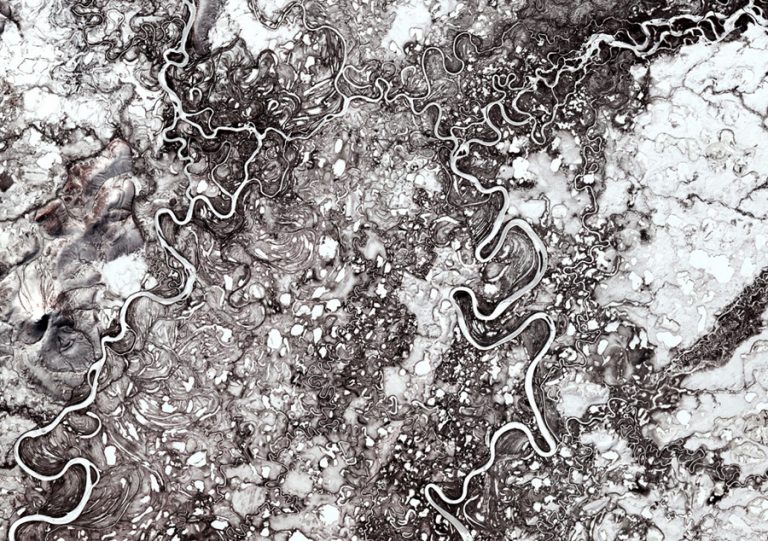
![[text] dis-orientation and its aftermath](https://media.giphy.com/media/L35lnVzYLgHFS/giphy.gif)
![[curso] fonaments del disseny](https://blogger.googleusercontent.com/img/b/R29vZ2xl/AVvXsEgD02few_onlQayFaMENECRZYVjbfJ-1BivdgWn_PntkkwCCG8jUGdswJyugFctCcFRBB3lwSXUZotFCc5EnxqfxSKywMrdfAVfBXvPsb7vcdIdr2RUowODsgri4EReXMudK_3IAStF_3w/s1600/fonaments3.jpg)
![[revista] L/EN/G/U/A/J/E/o](https://blogger.googleusercontent.com/img/b/R29vZ2xl/AVvXsEgdBBru_p5K4zK77CmgtRcK2hLubFw46lHgQqqXqJoMuEeIDJr1933trw0vcve7q3b9Mhjy96nYQDPxWYddDZ60RbtwCZcUoIYJq_F7WWd9xsnfoqhXgyZNquQLkFNbsbz7dDJoaXRZZWc/s320/Captura+de+pantalla+2017-09-10+a+la%2528s%2529+21.46.40.png)
![[methodology] workshop à la carte](https://blogger.googleusercontent.com/img/b/R29vZ2xl/AVvXsEirP91N_kdgle-XhzJxTu9qeU4rnpcG-tl-z6em-_ecKjZpIsTgRgOQn19a5SLVkW3SJ6rbkWNg7gCHdRFtXMkc4gE4OpWRGHcch_ylyVaNDjSXLkXPrRD8wf02542DxRh07xWwc54Hbxw/s1600/teo.png)
![[text] tongues in the making](https://blogger.googleusercontent.com/img/b/R29vZ2xl/AVvXsEgXl-8Ave1Yx3VqxhcrI24uG_fzX8Ohc8LNjgv8KkTq4s1W9J0LH_iVG22E22ojnNFUauSMGvN9M_JMRod7iHqahzkJMHjWvHPV0B4v1i14iRtGWNga8NmZ-LdXXlOPqAtdISnR2MQFd1Q/s1600-r/Captura+de+pantalla+2016-02-04+a+las+13.53.52.png)


![[article] Let's first get things done! / Fiberculture Journal #26](https://blogger.googleusercontent.com/img/b/R29vZ2xl/AVvXsEhaDyKgtq30kos1sAGxvccGpJru0lFDJpNdr2Znui0GZq-uBP4rv7qq4wxZIHlAqGloQcjpEfhYlftguJHCfQakT3_ddO8Rs5opBTGClnrALMsSpNtDyR2ljW37LPnBtUfJ1gEO_aZqvt0/s1600-r/graph.png)

![[paper] "La materia contraataca: una tentativa objetológica"](https://blogger.googleusercontent.com/img/b/R29vZ2xl/AVvXsEhqled-DehDpXZnTMEkO0WSjozmkdTcjnEaTT27rrnu1q69whrT275w3Hs7zzeUtLfNJXs73mXB1Q0lwJjR2AGzInb6WpEUfRFWRui5s-YhE7CAf89z1j3TDKQMAmIyDr_XF22DcA9506I/s1600-r/m%25C3%25A1quina_cuadruple+haz.jpg)

![[libro] "El futuro de los centros culturales en la europa creativa"](https://blogger.googleusercontent.com/img/b/R29vZ2xl/AVvXsEjkwzqzUznKska3wNFn9G6GyFhyphenhyphen6v2ptsM6suKRqoeq6FUzv7Rs8mx3YQABu9QFWpj0XPZs32NhE2DNCgRSMEnnhPw4SQjSKsm1MuMrEvBDnO7z__-iWxNqt1Mn61h00R-4Co76tF7EdXY/s1600/euroz.jpg)
![[wiki] protocol for interdisciplinary research / Hangar / Grid_Spinoza](https://blogger.googleusercontent.com/img/b/R29vZ2xl/AVvXsEjmi8Df_v7kPAefpI6pLe-Xl-NhQx3VsKNEiZGO_tB1E2HCbKmQY69oI6SkN36aCFzzlI0ihwKUevFeZbmEAT-YBIGGCTfE_XlHvVbRHrnAAJS7_aCsOZW9bmeIzv1U06IVz_ik6btFPfM/s1600-r/Pantallazo.png)


![[monográfico] Laboratorios de Procomún](https://blogger.googleusercontent.com/img/b/R29vZ2xl/AVvXsEjjbDSQa0RdXhfgnejeyUgQL7ae7l7d3rC5-NoyRkrNiLiMGdo27hBA2NIiJTGDVDwkJ1JZuVh9rnQYhvbdZf8ru5Ou1W-trOX7QfMPS0h3t57HEiY3wu4CeXrWW9TfDk7VpKP6rvb17HU/s1600-r/teknokultura.png)









